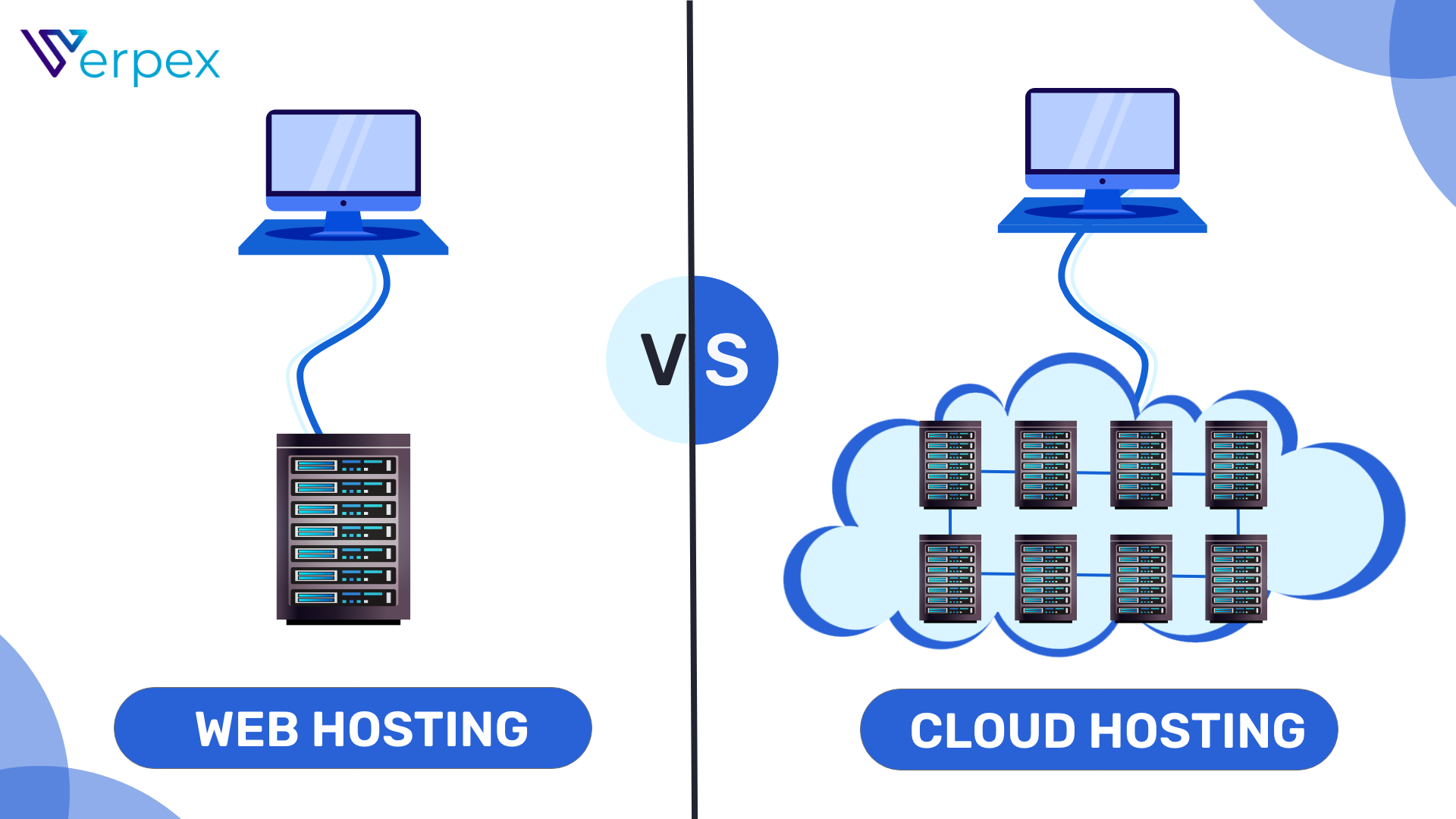Cloud hosting is a type of web hosting. It uses multiple servers to balance the load and maximize uptime.
This makes it a reliable option for many businesses. Cloud hosting works by using a network of virtual servers. These servers pull their computing resources from extensive underlying networks of physical web servers. This setup allows for flexible resource allocation, ensuring your website stays online even if one server fails.
It eliminates the need for a single point of failure, providing enhanced reliability and performance. By distributing data across multiple servers, cloud hosting ensures your website can handle more traffic and data with ease. In this blog post, we will explore the ins and outs of cloud hosting, how it operates, and why it might be the right choice for your business.

Credit: verpex.com
Introduction To Cloud Hosting
Cloud hosting is a term many hear but few understand. It’s a modern solution for storing and accessing data online. This hosting type has become essential in today’s digital age.
Definition Of Cloud Hosting
Cloud hosting means storing data across many servers. These servers are connected via the internet. This setup allows for easy access and management of data.
With cloud hosting, data doesn’t rely on one physical server. Instead, it spreads across multiple servers. This ensures better reliability and uptime.
Importance In Modern Computing
Cloud hosting is crucial in modern computing. It offers flexibility and scalability. Businesses can scale resources up or down based on their needs.
It also enhances performance. Data hosted in the cloud can be accessed from anywhere. This is vital for remote work and global collaboration.
Security is another key benefit. Cloud hosting providers invest heavily in security measures. This keeps data safe from threats.
In summary, cloud hosting supports modern business needs. It provides a reliable, scalable, and secure way to manage data.
Key Features
Cloud hosting offers scalability, reliability, and flexibility. It distributes resources across multiple servers, ensuring optimal performance and minimal downtime. Ideal for growing businesses.
Cloud hosting offers a range of features that make it a popular choice for businesses. Understanding these key features can help you decide if cloud hosting is right for you. Let’s explore some of the main advantages of cloud hosting.Scalability
Cloud hosting is highly scalable. You can easily adjust resources based on your needs. If your website traffic increases, you can add more bandwidth or storage. This means you only pay for what you use. No need to overcommit to resources you might not need. This flexibility helps manage costs effectively.Flexibility
Flexibility is another major benefit. With cloud hosting, you can access your data from anywhere. As long as you have an internet connection, you can manage your website. This is especially useful for remote teams. You can also choose different levels of service. From basic plans to advanced options, there is something for everyone. Cloud hosting also offers various levels of control. You can opt for managed or unmanaged services. Managed services include support and maintenance. Unmanaged services give you full control over your setup. Choose what fits your business needs best.How Cloud Hosting Works
Cloud hosting is a modern way to host websites and applications. It uses multiple servers to ensure high availability and performance. This section explains how cloud hosting works.
Server Distribution
Cloud hosting spreads your website’s data across many servers. These servers are located in different places. This is called server distribution. It helps reduce the risk of downtime. If one server fails, another server takes over. This makes your website more reliable.
Load Balancing
Load balancing is a key part of cloud hosting. It helps manage the traffic to your website. Load balancers distribute the traffic evenly across multiple servers. This prevents any single server from getting overloaded. It ensures that your website runs smoothly. Users get a fast and consistent experience.

Credit: www.milesweb.com
Types Of Cloud Hosting
Cloud hosting has different types. Each type serves specific needs. Understanding these types helps you choose the right one. Below are the main types of cloud hosting.
Public Cloud
Public cloud hosting is popular. It offers services over the internet. Many users share the same resources. This type is cost-effective. You pay only for what you use. It is flexible and scalable. It suits businesses of all sizes. Providers manage the infrastructure. Users focus on their applications. Popular examples include AWS, Azure, and Google Cloud.
Private Cloud
Private cloud hosting is secure. It is dedicated to a single organization. No shared resources here. It offers more control and privacy. This type is ideal for sensitive data. It can be on-premises or hosted by a provider. Businesses with strict regulations prefer this. Private clouds can be expensive. They offer high performance and reliability.
Benefits
Cloud hosting offers a range of benefits that can enhance your website’s performance and lower costs. Let’s explore some key advantages:
Cost Efficiency
With cloud hosting, you only pay for what you use. This model eliminates the need for expensive hardware investments. You also save on maintenance costs. Cloud hosting providers handle server upkeep, saving you time and money.
| Traditional Hosting | Cloud Hosting |
|---|---|
| Fixed pricing | Pay-as-you-go |
| Hardware investments | No hardware costs |
| Maintenance fees | Provider handles upkeep |
Improved Performance
Cloud hosting improves website performance. It uses multiple servers to share the load. This setup reduces downtime and ensures fast load times. If one server fails, others take over.
- Multiple servers enhance reliability.
- Fast load times improve user experience.
- Reduced downtime ensures availability.
Cloud hosting also scales resources based on demand. This flexibility ensures optimal performance during traffic spikes.
Challenges
Cloud hosting offers numerous benefits. But it also comes with challenges. Understanding these challenges can help in better decision-making.
Security Concerns
Security remains a major challenge in cloud hosting. Data stored in the cloud is vulnerable to attacks. Unauthorized access and data breaches are significant risks. Providers offer security measures, but they are not foolproof. Regular security audits and updates are essential. Users must also implement strong passwords and encryption.
Downtime Issues
Downtime is another challenge in cloud hosting. Even the best providers experience outages. These can disrupt business operations and lead to loss of revenue. Providers usually offer Service Level Agreements (SLAs) to guarantee uptime. But no system is immune to failures. Regular backups and disaster recovery plans are necessary. This ensures continuity even during outages.
Choosing A Provider
Choosing the right cloud hosting provider is crucial. The right provider ensures smooth operations. A wrong choice can lead to issues and downtime. Consider several factors before making a decision.
Factors To Consider
When selecting a cloud hosting provider, consider these factors:
- Reliability: Ensure the provider offers high uptime guarantees.
- Scalability: Choose a provider that allows easy resource scaling.
- Security: Look for robust security measures and compliance certifications.
- Support: Ensure 24/7 customer support availability.
- Cost: Compare pricing plans and look for hidden costs.
- Performance: Check server performance and speed.
Popular Providers
Several popular cloud hosting providers offer reliable services:
| Provider | Key Features |
|---|---|
| Amazon Web Services (AWS) | High scalability, wide range of services, strong security |
| Google Cloud Platform (GCP) | Strong integration with Google services, AI and ML capabilities |
| Microsoft Azure | Seamless integration with Microsoft products, hybrid cloud support |
| DigitalOcean | Simple interface, cost-effective, good for developers |
These providers offer various features. Evaluate them based on your needs. A good provider can significantly impact your business operations.

Credit: www.downgraf.com
Future Of Cloud Hosting
The future of cloud hosting looks promising and full of potential. As technology advances, cloud hosting continues to evolve. Businesses can expect enhanced features and more efficient services. It is vital to understand emerging trends and their impact.
Emerging Trends
One significant trend is the adoption of serverless computing. This allows companies to run applications without managing servers. It reduces costs and simplifies processes. Another trend is edge computing. This brings data processing closer to the data source. It leads to faster response times and improved performance.
AI and machine learning integration is also on the rise. These technologies enhance security and optimize resource management. Companies can predict and prevent issues before they occur. Hybrid cloud solutions are becoming popular. They offer flexibility by combining private and public clouds. Businesses can choose the best environment for each task.
Impact On Businesses
Cloud hosting has a profound impact on businesses. It enables scalability. Companies can easily adjust their resources based on demand. This agility is crucial for growth. Cost-effectiveness is another benefit. Cloud hosting reduces the need for physical hardware. Businesses save on maintenance and upgrade costs.
Enhanced collaboration is possible with cloud hosting. Teams can access and share data from anywhere. This improves productivity and streamlines workflows. Data security is also enhanced. Cloud providers invest heavily in security measures. Businesses can trust their data is safe and secure.
In summary, the future of cloud hosting is bright. Emerging trends and their impact on businesses are significant. Companies should stay informed and adapt to remain competitive.
Frequently Asked Questions
What Is Cloud Hosting?
Cloud hosting is a type of web hosting that uses multiple servers to balance the load. It maximizes uptime and performance by distributing resources across several servers.
How Does Cloud Hosting Work?
Cloud hosting works by connecting multiple servers to create a single network. This network hosts websites or applications, ensuring reliability and scalability.
What Are The Benefits Of Cloud Hosting?
Cloud hosting offers high reliability, scalability, and performance. It allows easy resource scaling, better uptime, and cost-effectiveness by paying for only what you use.
Is Cloud Hosting Secure?
Yes, cloud hosting is secure. Providers implement advanced security measures, such as encryption, firewalls, and regular updates, to protect data.
Conclusion
Cloud hosting offers flexibility and scalability for your website. It distributes resources across multiple servers. This ensures higher uptime and reliability. Businesses can easily handle traffic spikes. Costs are based on actual usage, saving money. Cloud hosting is ideal for growing websites.
It also provides robust security features. Simplify your hosting with cloud solutions. Start benefiting from advanced technology today.